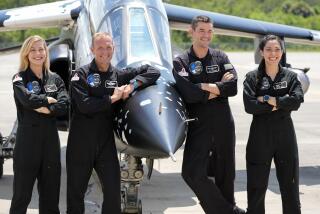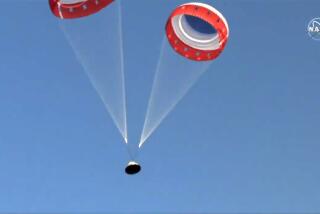NASA Fears Weather May Add to Shuttle Delays
- Share via
KENNEDY SPACE CENTER, Fla. — Faced with deteriorating weather conditions, officials with the National Aeronautics and Space Administration were desperately hoping for success in their third effort to launch the space shuttle Columbia this morning, but one of 30 “astrorats” won’t be making the trip.
The rats, which will be dissected after the mission so that scientists can study how they adjusted to weightlessness, are housed in individual enclosures, and the small line that feeds drinking water into one of the plastic condos “malfunctioned,” according to test director Mike Leinbach.
As a result, only 29 of the rats were loaded aboard the shuttle, and the remaining rat will be sent back to the University of Florida for other research.
With its programs seemingly under attack from every direction, NASA needed to chalk one up in the win column today, but after overcoming technical problems that forced two early launch delays officials feared that Florida’s fickle weather was turning against them.
A cold front was moving into the area, and the weather was expected to be “quite marginal” at launch time, according to Air Force meteorologist Mike Adams. The front was expected to bring winds and possible thundershowers that would violate NASA’s launch restrictions.
A two-hour launch window gave NASA the option of blasting off any time between 5 a.m. and 7 a.m., Pacific time, but Adams said the chances were only about 50-50.
This is the 41st flight in the shuttle program, and the first dedicated entirely to biomedical research. It is the 11th flight of the Columbia, the oldest shuttle in the fleet.
In addition to the rats, the Columbia has about 2,500 tiny jellyfish aboard. Jellyfish are among the simplest organisms on the planet, and scientists are interested in how such a primitive creature uses gravity to maintain its balance.
The seven members of the crew will also serve as test animals. Scientists hope this flight will tell them more about how humans adjust to weightlessness than they have learned during the entire history of the space program.
Marine Corps Col. Bryan D. O’Connor, 44, is the Columbia’s skipper and Air Force Lt. Col. Sidney M. Gutierrez, 39, is the pilot.
More to Read
Sign up for Essential California
The most important California stories and recommendations in your inbox every morning.
You may occasionally receive promotional content from the Los Angeles Times.













